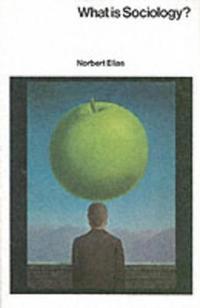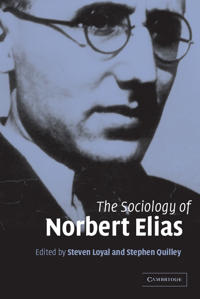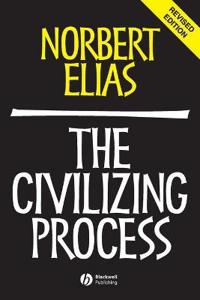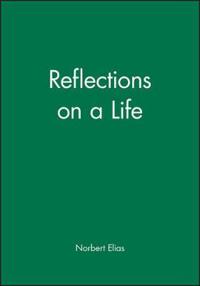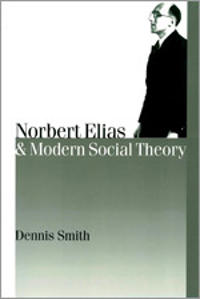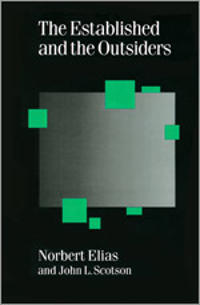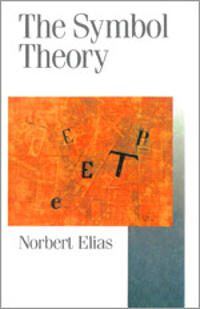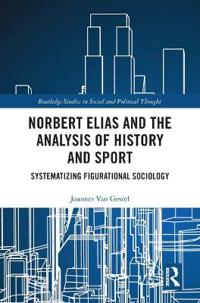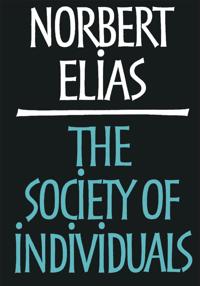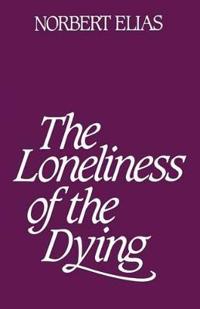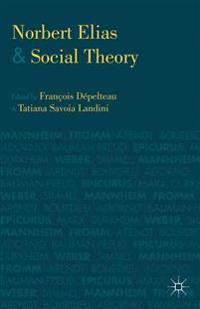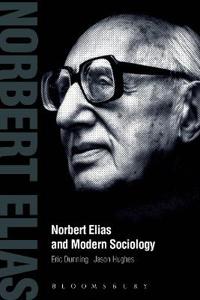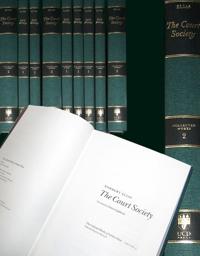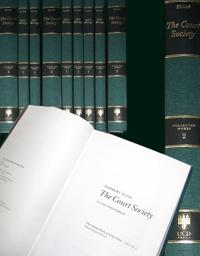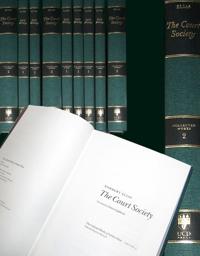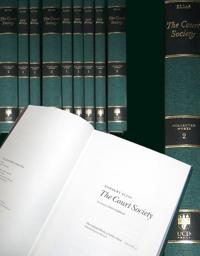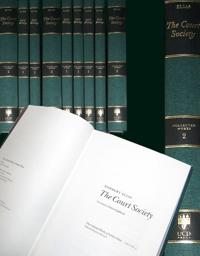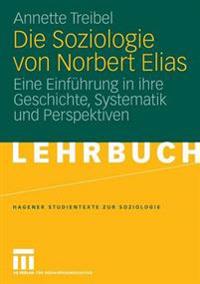What is Sociology? (Häftad)
avNorbert Elias
ISBN: 9780231045513 - UTGIVEN: 198408What is Sociology? presents in concise and provocative form the major ideas of a seminal thinker whose work -- spanning more than four decades -- is only now gaining the recognition here it has long had in Germany and France. Unlike other post-war sociologists, Norbert Elias has always held the conc[...]
The Sociology of Norbert Elias (Pocket)
avSteven (EDT) Loyal, Stephen (EDT) Quilley, Steven (EDT) Loyal
ISBN: 9780521535090 - UTGIVEN: 2004-04Norbert Elias has been described as a great sociologist and over recent years there has been a steady upsurge of interest in his work. Yet despite the fact that he was active for nearly sixty years from the 1920s to the 1960s it was only in the 1980s that English translations of his works became wid[...]
The Civilizing Process: An Introduction to Bilingualism (Häftad)
avNorbert Elias
ISBN: 9780631221616 - UTGIVEN: 200007* Completely overhauled version of the combined classic texts The History of Manners and State Formation and Civilization. * Revised throughout, updated postscript and bibliography, and line corrections made from the original version. * Contents lists combined and restructured. .[...]
Reflections on a Life (Häftad)
avNorbert Elias
ISBN: 9780745613833 - UTGIVEN: 199410This book provides a valuable insight into the work and life of Norber Elias - one of the most important social thinkers of the twentieth century. It includes an extended interview with Elias and an autobiographical account which demonstrates the connection between the development of his theories an[...]
Mozart (Häftad)
avNorbert Elias
ISBN: 9780745614106 - UTGIVEN: 199409Now available in paperback, Mozart is a brilliant study of the great composer's life and creative genius, written by one of the most important social thinkers of our time. In Mozart, Elias provides insight into this case of tragic conflict between personal creativity and the tastes of a society [...]
Norbert Elias and Modern Social Theory (Pocket)
avDennis Smith
ISBN: 9780761961086 - UTGIVEN: 2001-01Offering a fascinating survey of Norbert Elias's life and writings, Dennis Smith traces the growth of his reputation. He is the first author to confront Elias's work with the contrasting theories of Talcott Parsons, Hannah Arendt, Michel Foucault and Zygmunt Bauman. He also illustrates how Elias's i[...]
The Established and the Outsiders (Häftad)
avNorbert Elias, John Lloyd Scotson
ISBN: 9780803979499 - UTGIVEN: 199411This new edition of this classic text from one of the major figures of world sociology includes an introduction published in English for the first time. In Norbert Elias's hands, a local community study of tense relations between an established group and outsiders becomes a microcosm that illuminate[...]
The Symbol Theory (Häftad)
avNorbert Elias
ISBN: 9780803984196 - UTGIVEN: 199107In The Symbol Theory, Norbert Elias draws together three central themes. At the first level the book is concerned with symbols in relation to language, knowing and thinking. Secondly, Elias stresses that symbols are also tangible sound-patterns of human communication, made possible by the evolutiona[...]
Norbert Elias, Social History and Sport
ISBN: 9780815380665 - UTGIVEN: 2018-05In times when the social sciences have become increasingly fragmented and more focused on `the pieces of the puzzle', the puzzle, as a topic in its own right, has slowly been moved towards the background. Nonetheless, as humanity becomes ever more globalized, there is a greater need for in-depth dis[...]
The Society of Individuals (Häftad)
avNorbert Elias
ISBN: 9780826413727 - UTGIVEN: 2001-09Originally published in 1991 and now reissued by Continuum International, this book consists of three sections. The first, written in 1939, was either left out of Elias's most famous book, The Civilizing Process, or was written along with it. Part 2 was written between 1940 and 1960. Part 3 is from [...]
The Loneliness of Dying (Häftad)
avNorbert Elias
ISBN: 9780826413734 - UTGIVEN: 2001-09Originally published in 1985, this is a short meditation by a great old man on people relating to other people who are dying, and the need for all of us to open up.[...]
Norbert Elias and Social Theory (Inbunden)
ISBN: 9781137312105 - UTGIVEN: 2013-11Norbert Elias has been recognized as one of the key social scientists of the twentieth century. The contributions collected in Norbert Elias and Social Theory discuss the specificities, the strengths, and the limits of Elias's sociology by considering its similarities and its differences with other [...]
Norbert Elias and Social Theory
ISBN: 9781349457168 - UTGIVEN: 2013-11This book will compare the approach and works of Norbert Elias, well known for his analysis of the civilizing process, his work on sport and violence and, more largely, his figurational approach, with other important social theories both classical and contemporary.[...]
Norbert Elias and Figurational Research: Processual Thinking in Sociology (Häftad)
avNorman Gabriel, Stephen Mennell
ISBN: 9781444339574 - UTGIVEN: 2011-08-31Norbert Elias has been increasingly recognised as one of the most important sociologists of the twentieth century, and, moreover, one whose writings retain their significance and relevance for the twenty-first century. This monograph provides a unique perspective on Elias's thought.[...]
Norbert Elias and Modern Sociology (Häftad)
avEric Dunning, Jason Hughes
ISBN: 9781780932262 - UTGIVEN: 201212This book explores the interplay between the making of Elias as a sociologist and the development of his core ideas relating to figurations, interdependence, and civilising processes. Focusing on the relevance of Elias's work for current debates within sociology, the authors centrally consider his c[...]
The Court Society (Inbunden)
avNorbert Elias
ISBN: 9781904558408 - UTGIVEN: 200603This classic study of the life of the nobility at the royal court of France, especially under Louis XIV, has long been out of print. Recognised by historians as the benchmark for studies of early modern courts, which were an important but long neglected phase in the growth of the 'civilising' constr[...]
Quest for Excitement (Inbunden)
avNorbert Elias, Eric Dunning
ISBN: 9781904558439 - UTGIVEN: 200809Elias effectively founded the modern sociology of sport in collaboration with Eric Dunning in the 1960s and 1970s. They argue that in highly constrained, 'civilised' societies, sports - as well as a spectrum of other cultural and leisure activities - are to be understood not in terms of 'relaxation'[...]
The Established and the Outsiders (Inbunden)
avNorbert Elias, John L. Scotson
ISBN: 9781904558927 - UTGIVEN: 200901In "The Established and the Outsiders", Elias and Scotson explain differences in power and rank between two very similar groups - both working class - in a local community studied in the early 1960s. They show how one group monopolised sources of power and used them to exclude and stigmatise members[...]
Essays I: On the Sociology of Knowledge and the Sciences (Inbunden)
avNorbert Elias, Richard Kilminster, Stephen Mennell
ISBN: 9781906359010 - UTGIVEN: 2010-01Studies on the Germans (Inbunden)
avNorbert Elias
ISBN: 9781906359089 - UTGIVEN: 2013-06Studies on the Germans, Volume 11 of the Collected Works, was first published in German in 1989, exactly 50 years after Elias' most famous work, On the Process of Civilisation. The essays in the book were written independently of each other over three decades. In this new edition, Elias' original En[...]
Über den Prozeß der Zivilisation I/II (Pocket)
avNorbert Elias
ISBN: 9783518099346 - UTGIVEN: 2010-01stw 158-159
Die Soziologie Von Norbert Elias: Eine Einfuhrung in Ihre Geschichte, Systematik Und Perspektiven (Häftad)
avAnnette Treibel
ISBN: 9783531160818 - UTGIVEN: 2008-09:Norbert Elias (1897 - 1990) gehört zu den Klassikern der Soziologie und ist ein herausragender Gelehrter und eindrucksvoller Zeitzeuge des 20. Jahrhunderts. Berühmt geworden ist er durch sein Werk 'Über den Prozeß der Zivilisation'. Dadurch gilt er als Begründer der Zivilisations- und Prozesst[...]

